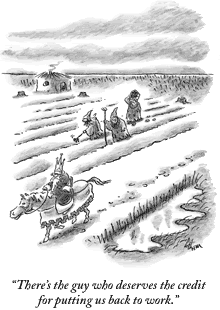In the summer of 1974, as I rode with my family in a new Ford Galaxy
500 station wagon, the air conditioning was on. It was on because
we were in New Mexico, and it was Very Hot. We came over the
Organ mountains, approaching Las Cruces. My sister cried out:
"wow, they have a lot of sky here!"

Indeed,
they do have a lot of sky. My parents got us a membership at the
NMSU swimming pool, because, although there is a lot of sky, there is
not much for teenagers to do. When I was not at the pool, I was
at the local library. In fact, I read all the books in the
library's psychology section that year. I learned about the
principle of psychic determinism. That is the notion that
everything that is going on in your brain, at any given moment, is a
product of what was going on in your brain the moment before, plus
whatever sensory input is occurring at the time.
According to the principle of psychic determinism, there are no non
sequiturs. Sometimes people say things that do not seem to fit
with the topic at hand. But, in the mind of the speaker, there
always is a connection between what was said a moment ago, and what is
being said now. Apparent non sequiturs can be annoying.
Usually, though, one merely has to wait a few moments in order for the
connection to become clear.
One day, at the pool, I met a young lady. We became
friends. One other day, I think she was trying to impress me,
because she made me lunch. I was at her house, she opened the
refrigerator, and asked me if I wanted a steak. I, like almost
any 15-year old boy, when asked if he wants a steak, did in fact want a
steak. Honoring my mother's direction to be honest at all times,
I said "yes."
She cooked the steak. I ate it. It was very good. I
didn't think about it again for several weeks. Later, I went to
the young lady's house again. Her father was there. He
looked up at me and asked, rather gruffly, "Are you the guy who ate my
steak?"
"Uhhh, yes, I am."

He
looked down at the table for a moment, as though to soften the impact
of what might have been perceived as a rude way to introduce yourself
to someone you just met. He then asked, "What is the difference
between
accuracy and
precision?" I did not know it
at the time, but he was a civilian engineer at the White Sands missile
range. He was involved in the design and testing of
missiles. (The military is interested in the accuracy of its
missiles.)
The alert reader will have deduced that I was a bit of a bookworm, at
the time, so I happened to know the answer. I also knew about the
principle of psychic determinism, so I knew that if I were patient, the
rationale for the apparent non sequitur would become apparent. I
replied something like this: "Accuracy is how close a measurement is to
the real value, whereas precision is how close repeated measurements
are to each other."
He threw his hands in the air, and said, "I can't believe it!
I've been trying to get the US military to understand the difference,
and they can't get it straight. But here's some teenage kid who
knows!" He was nice after that.
What was the connection? I had eaten his steak, and dated his
daughter. Apparently, those two things were OK, since I knew the
difference between
accuracy and
precision. It does not matter if you get two strikes, if the third swing results in a home run.
Ever since then, I have understood the importance of the ability to make a distinction between two related concepts.
There was more discussion of accuracy and precision. "Accuracy
means truth. Precision means repeatability." If missiles
are perfectly accurate, then all missiles launched at Target A will hit
Target A. If missiles have perfect precision, then all missiles
launched at Target A will hit the same spot, which may or may not be
the target. Thus, it is possible to have perfect precision, but
no accuracy; whereas perfect accuracy always is accompanied by perfect
precision. People get mixed up about this all the time.

It
is tempting, of course, to think that if you measure something several
times, and come up with the same value every time, that the
measurements indicate some kind of fundamental truth. But is
someone hands you a ruler that is not really a foot long, all the
measurements you make with that ruler will be wrong. The errors
you make will be
systematic errors.
Likewise, if you listen to someone talk, and he or she always says the
same thing, it is tempting to think that what they are saying reflects
the truth about what is going on inside their head. It follows
from the principle of psychic determinism, that what they are saying is
related to what is going on in their head. The thing is, the
relationship between what is going on in their head, and what they are
saying, may be systematically distorted. Thus, the fact that the
person always gives the same answer does not mean that the answer is
correct.

When you listen to a person talk, you are trying to get a measurement
of what is going on inside their head. Of course, this is a bit
like trying to size up your daughter's suitor. If the person is
honest, what he says is a good reflection of what he is thinking.
But if he is systematically dishonest, you cannot believe anything he
says, never mind that he always gives the same answer to the same
question. In fact, the precision with which he speaks may be a
part of his effort to deceive. Like the person who handed you the
fake ruler, the pathological liar knows that if he always gives the
same answer, you will be tempted to mistake precision for accuracy.
Taking the measure of a potential suitor is sort of like taking the
measure of a potential president. It is reassuring if he or she
always says the same thing, but that does not mean that that the truth
is being spoken.


 ANN ARBOR, MI -The rigors of medical
school teach the information required to become a physician, but when
it comes to surgery, the greatest teacher is experience. Traditional
training is done through a type of immersive apprenticeship, with
experienced surgeons teaching residents in the operating room over a
period of years.
ANN ARBOR, MI -The rigors of medical
school teach the information required to become a physician, but when
it comes to surgery, the greatest teacher is experience. Traditional
training is done through a type of immersive apprenticeship, with
experienced surgeons teaching residents in the operating room over a
period of years.






 It
is tempting, of course, to think that if you measure something several
times, and come up with the same value every time, that the
measurements indicate some kind of fundamental truth. But is
someone hands you a ruler that is not really a foot long, all the
measurements you make with that ruler will be wrong. The errors
you make will be systematic errors.
It
is tempting, of course, to think that if you measure something several
times, and come up with the same value every time, that the
measurements indicate some kind of fundamental truth. But is
someone hands you a ruler that is not really a foot long, all the
measurements you make with that ruler will be wrong. The errors
you make will be systematic errors.
 I
have watched horses. When a horse first becomes active in the
morning, after it is done sleeping, or whatever it is that horses do at
night, the first thing it thinks is: "I think I'll eat some hay today."
I
have watched horses. When a horse first becomes active in the
morning, after it is done sleeping, or whatever it is that horses do at
night, the first thing it thinks is: "I think I'll eat some hay today." While
we all are celebrating the outcome of the recent election in the USA,
let's all increase our joy by reading the good news out of Iraq, from a
soldier stationed there.
While
we all are celebrating the outcome of the recent election in the USA,
let's all increase our joy by reading the good news out of Iraq, from a
soldier stationed there.
 :
Joseph j7uy5
:
Joseph j7uy5